Journal excerpts - Wendy Maragh Taylor
On Arrival – Activities of Daily Living
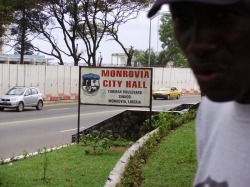
Monrovia - City Hall
Wednesday, 6/30/2010
We were exhausted and hot, having traveled from New York to Belgium with a stop at Côte d'Ivoire (Ivory Coast) to finally arrive in Liberia, West Africa. Joseph had been trying to prepare me for the many differences in privileges of daily living that we have in New York, and industrialized countries in general, in contrast to what I would find in Liberia. So it was with a happy heart – and a sigh of relief – that I made my way through his brother’s house in Monrovia to the room that was offered to us and found a bathroom. It was less modern than we were used to, but the basics were present. There was a toilet, one of my biggest concerns, and even a bathtub. I was indeed pleasantly surprised. I was definitely ready for a shower, to unwind and get out of my almost 24 hours traveling clothes. Without realizing it, I must have said as much out loud.
“No, there is no shower.”
“Oh, that’s okay, no problem,” I replied to my sister-in-law and genuinely meant.
“You are ready for a bath?” Linda and I were meeting for the first time and she was eager to please, to make us feel at home – as I would later find out that most Liberians are, indeed a warm and welcoming people. “You need hot water? I will heat it for you.”
“Oh no, you don’t have to do that.”
Linda had already taken my bags, brought house slippers to me, and opened up the serving dishes on the table to show us all that she had prepared – an experiment for her to cook all vegan food. I certainly didn’t want her to go and draw me a bath too.
We were exhausted and hot, having traveled from New York to Belgium with a stop at Côte d'Ivoire (Ivory Coast) to finally arrive in Liberia, West Africa. Joseph had been trying to prepare me for the many differences in privileges of daily living that we have in New York, and industrialized countries in general, in contrast to what I would find in Liberia. So it was with a happy heart – and a sigh of relief – that I made my way through his brother’s house in Monrovia to the room that was offered to us and found a bathroom. It was less modern than we were used to, but the basics were present. There was a toilet, one of my biggest concerns, and even a bathtub. I was indeed pleasantly surprised. I was definitely ready for a shower, to unwind and get out of my almost 24 hours traveling clothes. Without realizing it, I must have said as much out loud.
“No, there is no shower.”
“Oh, that’s okay, no problem,” I replied to my sister-in-law and genuinely meant.
“You are ready for a bath?” Linda and I were meeting for the first time and she was eager to please, to make us feel at home – as I would later find out that most Liberians are, indeed a warm and welcoming people. “You need hot water? I will heat it for you.”
“Oh no, you don’t have to do that.”
Linda had already taken my bags, brought house slippers to me, and opened up the serving dishes on the table to show us all that she had prepared – an experiment for her to cook all vegan food. I certainly didn’t want her to go and draw me a bath too.
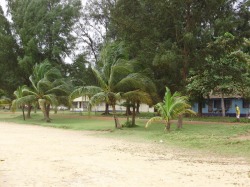
“No, no, I will do it.”
“Sister, it will be cold.”
“That’s no problem,” I continued, “If it is, I will just add a little warm water then.”
“So, I should warm the water?”
Linda looked at me with a little confusion on her face.
“No, it’s okay,” I repeated.
Going into the bathroom and reaching for the faucet, I realized there was none.
“Ah. . . Joseph,” I called out as softly as I could to my husband, “How do I turn on the water?”
True to form, my husband laughed: “Remember, I told you . . . there is no running water here. You have to use the water in the barrel.”
I turned around to see the large barrel filled with water. Now, I understood Linda´s perplexed look. Okay, I thought as I stepped out of the tub. I refused to let it be a problem. I put my finger in the water to check the temperature and realized now why Linda asked me if she should warm the water. It would be a bit of a shock to my body initially, but refreshing after the day’s journey. Yet, I was still a little confused.
“Hmm. . . Sweetheart,” I whispered to him again, “One more thing . . . How exactly do I get in?” The barrel was a little more than waist high and though I considered various possibilities, I couldn’t quite figure out how to climb in without the possibility of creating a scene which would bring my very eager to help in-laws, and all the children, running into the bathroom.
Want to know what happened next? Read the book: www.wendymaraghtaylor.com or www.amazon.com - "This
Part Of The Sky". A percentage of the proceeds from the sale of the book will go to the next phase of the Liberia Project - plans to build a separate school and playground.
“Sister, it will be cold.”
“That’s no problem,” I continued, “If it is, I will just add a little warm water then.”
“So, I should warm the water?”
Linda looked at me with a little confusion on her face.
“No, it’s okay,” I repeated.
Going into the bathroom and reaching for the faucet, I realized there was none.
“Ah. . . Joseph,” I called out as softly as I could to my husband, “How do I turn on the water?”
True to form, my husband laughed: “Remember, I told you . . . there is no running water here. You have to use the water in the barrel.”
I turned around to see the large barrel filled with water. Now, I understood Linda´s perplexed look. Okay, I thought as I stepped out of the tub. I refused to let it be a problem. I put my finger in the water to check the temperature and realized now why Linda asked me if she should warm the water. It would be a bit of a shock to my body initially, but refreshing after the day’s journey. Yet, I was still a little confused.
“Hmm. . . Sweetheart,” I whispered to him again, “One more thing . . . How exactly do I get in?” The barrel was a little more than waist high and though I considered various possibilities, I couldn’t quite figure out how to climb in without the possibility of creating a scene which would bring my very eager to help in-laws, and all the children, running into the bathroom.
Want to know what happened next? Read the book: www.wendymaraghtaylor.com or www.amazon.com - "This
Part Of The Sky". A percentage of the proceeds from the sale of the book will go to the next phase of the Liberia Project - plans to build a separate school and playground.
The Road Traveled – Going from Monrovia to Zorzor
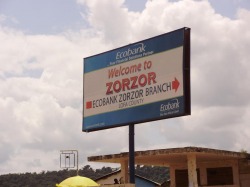
Friday, 7/2/10
What should have taken us a couple of hours traveling from Monrovia, the capital of Liberia, to Zorzor, the rural interior and where the project is going to take place, took us so much longer. Eight hours, three unpleasant quests because nature called (I dare not go there in such a public forum), a bump on the head which almost left me unconscious (the result of running from a lizard in hot pursuit of me), and three (yes, 3) flat tires later, we finally arrived at our destination.
Our ride through Monrovia was slow, as the streets are crowded. Every street looks like a market place – packed with people selling everything under the sun. There was fish, coconuts, used clothes, bed sheets, cell phones and so much more. In addition, there seemed to me to be competition between the cars and the motorcycles – and there are plenty of these. Both are used to transport people and goods throughout the city and outskirts. They race down the same packed streets and look as if and - later I would find out- feel like they are going dangerously fast. The car drivers and motorcycle riders don’t at all seem distracted by the constant noise of horns warning the pedestrians and approaching traffic. Stop and go traffic too close to running over pedestrians is not such a foreign concept to me. I am, after all, a New Yorker – except we do have traffic lights, police directing the flow of traffic in busy areas, seat belts and helmets. It was leaving Monrovia and continuing further into the interior, the more rural area, which made the difference between our countries clearer.
Most of the streets in Monrovia, and just outside it, are paved I’m told. Once leaving the city and the more crowded area and going at what often felt like 100 miles, I didn’t feel anything resembling smooth sailing. However, I did feel the difference once we hit the roads that were unpaved. Potholes in America have nothing over the dusty, rocky roads that we drove on.
What should have taken us a couple of hours traveling from Monrovia, the capital of Liberia, to Zorzor, the rural interior and where the project is going to take place, took us so much longer. Eight hours, three unpleasant quests because nature called (I dare not go there in such a public forum), a bump on the head which almost left me unconscious (the result of running from a lizard in hot pursuit of me), and three (yes, 3) flat tires later, we finally arrived at our destination.
Our ride through Monrovia was slow, as the streets are crowded. Every street looks like a market place – packed with people selling everything under the sun. There was fish, coconuts, used clothes, bed sheets, cell phones and so much more. In addition, there seemed to me to be competition between the cars and the motorcycles – and there are plenty of these. Both are used to transport people and goods throughout the city and outskirts. They race down the same packed streets and look as if and - later I would find out- feel like they are going dangerously fast. The car drivers and motorcycle riders don’t at all seem distracted by the constant noise of horns warning the pedestrians and approaching traffic. Stop and go traffic too close to running over pedestrians is not such a foreign concept to me. I am, after all, a New Yorker – except we do have traffic lights, police directing the flow of traffic in busy areas, seat belts and helmets. It was leaving Monrovia and continuing further into the interior, the more rural area, which made the difference between our countries clearer.
Most of the streets in Monrovia, and just outside it, are paved I’m told. Once leaving the city and the more crowded area and going at what often felt like 100 miles, I didn’t feel anything resembling smooth sailing. However, I did feel the difference once we hit the roads that were unpaved. Potholes in America have nothing over the dusty, rocky roads that we drove on.
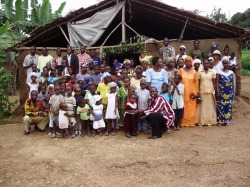
Welcome & Thank You to Donors
It was the bumpiest ride I have ever had and I had to hold on for dear life – sometimes to the door, at other times to my husband and frequently to both. And still, the man – who I questioned and mistakenly guessed was a boy in his teens when I met him the night before (the social worker in me is never asleep and I want to respect child labor laws wherever I am) – wouldn’t slow down. Driving as if in a race over what were huge rocks in the street, craters that seemed to split the land and some muddy roads, Collie eventually had to stop three times because of flat tires. The last bump took two of our tires out and we were forced to pull over with nothing but a prayer.
Want to know what happened next? Read the book: www.wendymaraghtaylor.com or www.amazon.com - "This
Part Of The Sky". A percentage of the proceeds from the sale of the book will go to the next phase of the Liberia Project.
Want to know what happened next? Read the book: www.wendymaraghtaylor.com or www.amazon.com - "This
Part Of The Sky". A percentage of the proceeds from the sale of the book will go to the next phase of the Liberia Project.
Beginning the Work – Hard Labor
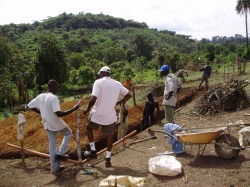
Sunday, 7/4/10
I carried cement blocks – first, on my shoulder, and then, on my head. Along with others, I did this while walking on a rough foot path that was approximately three quarters of a mile, and after already walking quite a distance from the center of town. The work of building is hard labor everywhere, but it is particularly difficult here in Zorzor, Liberia.
That morning, we decided that it would be best to go directly to the site to make our plans more practical – to see with what we are actually working. It was about a 10 minute walk from the mud hut where a group of us were meeting. The men started to warn Joseph and me immediately.
“It is not really a road. It can be hard to walk, maybe for the woman…” One person said as they all looked at me.
“The woman is from New York,” Joseph said under his breath and to me, holding out his hand to help me over the bumpy ground.
“It’s okay, don’t worry about me. I’m fine,” I felt a need to say to them, though thinking, I'm already perspiring and I haven't started to do any work yet.
“You are ready to work, sister,” Mulbah joked, pointing to my boots.
“Yes, that’s why I’m here . . . to work,” I smiled back while paying close attention to every hurdle over which I had to step.
When we got to a certain point, they stopped to show us an area filled with concrete blocks. These were the blocks that they had made ahead of time because they needed time to dry in order to be ready for use.
“Oh, great!” Joseph exclaimed, then questioned, “But why are they here and not on the actual land?”
“No trucks, cars or motorbikes can go there. See,” Dennis pointed behind and ahead of us, “this is not a road. We are the ones who made this path." Apparently, the truck dropped off the blocks on the road and the people had to move them one by one to the current location.
“Now, we will move it closer to the site," continued Bedell.
I carried cement blocks – first, on my shoulder, and then, on my head. Along with others, I did this while walking on a rough foot path that was approximately three quarters of a mile, and after already walking quite a distance from the center of town. The work of building is hard labor everywhere, but it is particularly difficult here in Zorzor, Liberia.
That morning, we decided that it would be best to go directly to the site to make our plans more practical – to see with what we are actually working. It was about a 10 minute walk from the mud hut where a group of us were meeting. The men started to warn Joseph and me immediately.
“It is not really a road. It can be hard to walk, maybe for the woman…” One person said as they all looked at me.
“The woman is from New York,” Joseph said under his breath and to me, holding out his hand to help me over the bumpy ground.
“It’s okay, don’t worry about me. I’m fine,” I felt a need to say to them, though thinking, I'm already perspiring and I haven't started to do any work yet.
“You are ready to work, sister,” Mulbah joked, pointing to my boots.
“Yes, that’s why I’m here . . . to work,” I smiled back while paying close attention to every hurdle over which I had to step.
When we got to a certain point, they stopped to show us an area filled with concrete blocks. These were the blocks that they had made ahead of time because they needed time to dry in order to be ready for use.
“Oh, great!” Joseph exclaimed, then questioned, “But why are they here and not on the actual land?”
“No trucks, cars or motorbikes can go there. See,” Dennis pointed behind and ahead of us, “this is not a road. We are the ones who made this path." Apparently, the truck dropped off the blocks on the road and the people had to move them one by one to the current location.
“Now, we will move it closer to the site," continued Bedell.
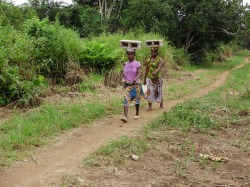
With that said each man picked up a block and proceeded to walk, motioning for us to come along. Not even thinking about whether or not I could manage it, I bent down to pick one up anyway, but they told me not to. It was the beginning of our time together and I decided to let them have it their way, for now. Besides, I had no idea of just how much further I would be walking and with perspiration streaming down my back, I thought it best to wait.
I was glad for it. By the time we arrived at the actual building site, I was out of breath and ready for a second meal. Not only was the distance another 10 minutes or so, but the scorching sun was melting me away, and the hike was one that required careful attention so as not to twist an ankle or trip over the uneven ground. It was indeed only a coarse path with bushes and branches jutting out at us. Sometimes we had to step aside to give the right of way to those coming with loads - buckets of water, basins with dishes, pieces of wood, and the like - on their heads.
Oh my, was my first thought when we finally got to the site. I couldn't tell where exactly we would start building, or start anything at all, for that matter. There were trees and shrubbery everywhere.
"We've been clearing the land," I heard someone say. All I could think was, It was worse than this.
In Zorzor there are no large machines to clear the land for building or make a road for transporting the materials closer to the site. So, the men used their cutlasses (machetes), going over every inch of the land on foot.
Joseph and Anthony - the builder who was asked to head the work - trailed by the handful of men Joseph has been communicating with over the last couple of years, began surveying the land and went right to drawing up the plans. It was decided that there would be one building, for now, which would function as the church and have classrooms in the back for the school. Within a couple of hours a draft was put together; they were using their feet, measuring tape and cell phones (which everyone has) to calculate the widths, lengths and number of cement blocks still needed. Some of the men were continuing to clear the land with their cutlasses, while others went to find sticks and rope needed to outline where to start digging the foundation.
Seeing a few women arrive with cement blocks on their heads, I decided to make myself useful. In my walk with the women, I heard "tank you" over and over. And though I was trying to pay attention to their appreciative words, I was distracted - deciding if I could actually carry the concrete blocks on my head like the other women. In the end, I decided against it. After all of the concern about Malaria, Yellow Fever or the like and whether the unrest which started in the interior - where we are - and led to the civil wars was really over, the last thing I wanted was for Joseph to have to explain to my mother how I broke my neck carrying cement blocks on my head.
I was glad for it. By the time we arrived at the actual building site, I was out of breath and ready for a second meal. Not only was the distance another 10 minutes or so, but the scorching sun was melting me away, and the hike was one that required careful attention so as not to twist an ankle or trip over the uneven ground. It was indeed only a coarse path with bushes and branches jutting out at us. Sometimes we had to step aside to give the right of way to those coming with loads - buckets of water, basins with dishes, pieces of wood, and the like - on their heads.
Oh my, was my first thought when we finally got to the site. I couldn't tell where exactly we would start building, or start anything at all, for that matter. There were trees and shrubbery everywhere.
"We've been clearing the land," I heard someone say. All I could think was, It was worse than this.
In Zorzor there are no large machines to clear the land for building or make a road for transporting the materials closer to the site. So, the men used their cutlasses (machetes), going over every inch of the land on foot.
Joseph and Anthony - the builder who was asked to head the work - trailed by the handful of men Joseph has been communicating with over the last couple of years, began surveying the land and went right to drawing up the plans. It was decided that there would be one building, for now, which would function as the church and have classrooms in the back for the school. Within a couple of hours a draft was put together; they were using their feet, measuring tape and cell phones (which everyone has) to calculate the widths, lengths and number of cement blocks still needed. Some of the men were continuing to clear the land with their cutlasses, while others went to find sticks and rope needed to outline where to start digging the foundation.
Seeing a few women arrive with cement blocks on their heads, I decided to make myself useful. In my walk with the women, I heard "tank you" over and over. And though I was trying to pay attention to their appreciative words, I was distracted - deciding if I could actually carry the concrete blocks on my head like the other women. In the end, I decided against it. After all of the concern about Malaria, Yellow Fever or the like and whether the unrest which started in the interior - where we are - and led to the civil wars was really over, the last thing I wanted was for Joseph to have to explain to my mother how I broke my neck carrying cement blocks on my head.
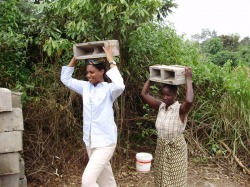
So, I made two trips with cement blocks on my shoulders, stopping along the way to rest and reassure the other women that I was fine. At the tale end of both trips, the men would see me coming, abandon their work and run over to help me. But, I am proud to say that I carried those blocks without incident and right to the end. And then, the last trip came.
Want to know what happened next? Read the book: www.wendymaraghtaylor.com or www.amazon.com -
"This Part Of The Sky". A percentage of the proceeds from the sale of the book will go to the next phase of the Liberia Project.
Want to know what happened next? Read the book: www.wendymaraghtaylor.com or www.amazon.com -
"This Part Of The Sky". A percentage of the proceeds from the sale of the book will go to the next phase of the Liberia Project.
Rain, Rain, Go Away, Come Back Another Day - Not That It Really Matters
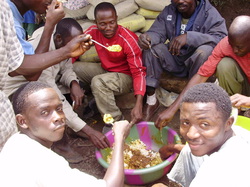
Tuesday, 7/6/10
It’s still raining and has been for the past five hours. It is not the first time that it's rained since we've been here; rain pours down everyday. In fact, we have been grateful for the reprieve from the scorching sun, a cooling off of the red hot earth of Zorzor. Usually, though, the rain starts and stops early in the morning - before the crowing of the rooster, which causes the dogs to bark and somehow overlaps, ever so slightly, with the Muslims' start of the day with a prayer song. Really, it is a most wonderful way to be awakened - the singing that is; I've had enough of both the crowing and the barking.
However, today is different. The rain does not stop in time for us to go out and work at our usual early hour. I'm not sure that anyone is up, so loud has been the pounding of rain for the last few hours. I was awakened at 2:30 am; I know this because I sleep with my watch and a flashlight under my pillow - just in case I need to identify some critter crawling on or biting me, which did happen one night. At first, the rain came down like nails; hitting the zinc roof on the cement and mud houses, it made a rattle that might have lulled me back to sleep had I not gotten tangled up in my mosquito net. I use the mosquito net as a cover - the closer it is to my skin, the more protected I feel during the mosquito swarming hours. Struggling to get free from the net, I was kept awake long enough to hear the clinking turn to thumping. Now, the rain comes down like sledge hammers pounding the nails into the roof just above us. I have never heard or seen rain like this, you probably have not either. “It's not raining cats and dogs,” I write on my faux postcards, “but lions and elephants.”
Around 8 am when it finally lets up, Joseph and I decide to make a run for it - hoping that the tapering off will soon come to a complete end.
Want to know what happened next? Read the book: www.wendymaraghtaylor.com or www.amazon.com - "This Part Of The Sky". A percentage of the proceeds from the sale of the book will go to the next phase of the Liberia Project.
It’s still raining and has been for the past five hours. It is not the first time that it's rained since we've been here; rain pours down everyday. In fact, we have been grateful for the reprieve from the scorching sun, a cooling off of the red hot earth of Zorzor. Usually, though, the rain starts and stops early in the morning - before the crowing of the rooster, which causes the dogs to bark and somehow overlaps, ever so slightly, with the Muslims' start of the day with a prayer song. Really, it is a most wonderful way to be awakened - the singing that is; I've had enough of both the crowing and the barking.
However, today is different. The rain does not stop in time for us to go out and work at our usual early hour. I'm not sure that anyone is up, so loud has been the pounding of rain for the last few hours. I was awakened at 2:30 am; I know this because I sleep with my watch and a flashlight under my pillow - just in case I need to identify some critter crawling on or biting me, which did happen one night. At first, the rain came down like nails; hitting the zinc roof on the cement and mud houses, it made a rattle that might have lulled me back to sleep had I not gotten tangled up in my mosquito net. I use the mosquito net as a cover - the closer it is to my skin, the more protected I feel during the mosquito swarming hours. Struggling to get free from the net, I was kept awake long enough to hear the clinking turn to thumping. Now, the rain comes down like sledge hammers pounding the nails into the roof just above us. I have never heard or seen rain like this, you probably have not either. “It's not raining cats and dogs,” I write on my faux postcards, “but lions and elephants.”
Around 8 am when it finally lets up, Joseph and I decide to make a run for it - hoping that the tapering off will soon come to a complete end.
Want to know what happened next? Read the book: www.wendymaraghtaylor.com or www.amazon.com - "This Part Of The Sky". A percentage of the proceeds from the sale of the book will go to the next phase of the Liberia Project.
Corruption - The American Way
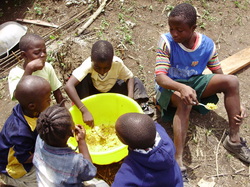
Saturday, 7/10/10
Today was a wonderful day of rest.
As we do every evening, we sat out on Kayea's, Joseph's Aunt, porch and ate our meal. But this evening neither of us was nodding off almost immediately after our meal, bowl still in hand. Early risings coupled with hard work can do that to you and it has every day, all week. Tonight, though, we have more energy to sit out and talk at length.
They love this. For the people here, we are entertainment of sorts. All that we do seems to draw attention. When we eat, they are curious as to why we have separate bowls - here people share, eating out of one bowl and sometimes using one spoon. This happens whether or not they are family. At first, I assumed it was just because of poverty. Scarce resources cause such restrictions, I thought. We even went to the market and bought a few bowls and spoons. Joseph's extended family smiled and thanked us, and the kids showed off to one another. However, the next morning they were back eating out of one bowl - four of them passing a spoon around the circle.
What we eat garners interest as well. When I noticed them staring as I ate my dessert, a hand full of trail mix, I held out the bag to them. First, there was a smile, then, close investigation - with the eyes - of what I was offering. Next, there was exploration by hand - fingering the cranberries, coconut shavings and almonds - before passing it to their mouths. Finally, they smiled with eyes widening.
"Sister, I like it."
Others call out to me using my Loma name, "Garmai," which was given to me by Joseph's aunt. Though everyone speaks English, the official language of Liberia, Loma is the native tongue spoken in Zorzor. "Garmai" means "truth.” Because Joseph told the truth when he said he would come back to help the people in Zorzor, and he brought me with him, Aunt Kayea gave me a new name.
"Garmai, it is good," one of the adults, smiling from ear to ear, proclaimed.
Immediately after this, the process began again. I offered them more and a crowd of children, called by their friends, appear:
"Come, come," I heard nine year old Zizi calling to her friends. She doesn't want them to miss out on the treat and they eagerly beckon to her urgings.
Leaning back in a hand-made wooden chair, Joseph teasingly whispered to me: "They're not going to be able to eat peanuts after this."
Peanuts are plenty in Zorzor, all of Liberia, really. It is a very common snack at any time of the day and people walk around with baskets of them for sale. During the week, those from the town often come by the building site and give us handfuls, a "thank you" of sorts.
Joseph's reference is to a couple occurrences earlier in the week. One morning, I just couldn't eat rice for breakfast. I had been gracious in accepting it the first two mornings, but just wasn't up for it on the third. I do like rice, but not for breakfast, lunch and dinner, everyday. I know that sounds very spoiled of me, but it’s simply the truth. So, I pulled out my peanut butter; yes, I brought peanut butter all the way from Poughkeepsie, New York to Liberia, West Africa. While Joseph said that Monrovia had most of the things we would need, he was clear that "up country" in Zorzor would be different. I didn't want to take any chances so I packed my peanut butter and lots of trail mix in my suitcase. I also brought along bread from Monrovia.
That morning, when they took the pot off of the coals and started to dish my rice, I said, "No thank you. I have something else this morning." All eyes became fixed on me.
I went about spreading peanut butter on slices of bread and offered them to the kids and adults nearby. Then, I ate a few of my own. They smiled, I smiled and when I offered up the spoon with a big scoop of the peanut butter, the children called to their peers and the spoon vanished from sight among the circle of them. I happily went off to work.
Well, the next morning when Joseph and I arrived for breakfast, there was a usual welcome party of little ones and grown-ups. Except for Zizi, the kids were sharing their bowl of rice. Zizi was looking rather sad and sat off to the side.
"Zizi, not hungry this morning?" I questioned.
She shook her head, but didn't look up.
"Is she okay?" I asked her grandmother.
She smiled and said something to her granddaughter in Loma, but the little girl just shook her head again.
Zizi's mother, Old lady, was hanging clothes on the line and responded: "She said she will only eat peanut butter and bread for breakfast … no more rice."
"Oh Lord …" I said looking at Joseph, who was already eating his bowl of rice, "I've corrupted them with my American ways."
Want to know what happened next? Read the book: www.wendymaraghtaylor.com or www.amazon.com - "This Part Of The Sky". A percentage of the proceeds from the sale of the book will go to the next phase of the Liberia Project.
This Part of the Sky – False Notions
Monday, 7/12/10
The one day that I was sick, I apparently missed some rousing conversation at the work site. Joseph came back for me to take our walk over to Aunt Kayea’s for dinner. I had been feasting on bottled water, Echinacea, raw garlic and cayenne pepper all day – though it sounds gross, the natural health remedies knocked the illness right out of my system. I wasn’t ready to start eating solid foods just yet, but I wanted to be out doors with everyone. We will be leaving in a couple days; we have already delayed our leave
once, because we want to complete the building before we go. I was already missing many things about Zorzor, particularly the
people.
During our walk, Joseph began to tell me about the discussions earlier in the day. "Baby, they idealize America so much… everything about it,” he said, shaking his head.
“Yeah,” I responded, thinking back on a conversation I had with his cousin Old lady, about the signs I had seen posted to stop abuse of girls and women – put up by the government at the request of Liberia’s female president. She was astounded to hear me say that this was a problem in America too.
“No,” she said, shaking her head. “Women do not get hurt in America.” I simply couldn’t convince her.
Joseph went on: “We talked about everything from homeless people … they laughed when I said there are people in the U.S. without a place to live. They said, ‘there are no poor people in America.’”
“I’m sure that was a shock to them,” I respond.
“Yeah, and then we started talking about how many people don’t go to school, drop out of high school and they couldn’t believe it…”
“Because so many of them are desperate for the opportunity to go to school,” I finished Joseph’s sentence.
“Then, out of nowhere, Emmanuel is swatting the flies away and says, “‘Oh it must be nice to be in America where there are no flies,’” Joseph was laughing. “I just couldn’t stop laughing … can you believe that? Somehow they think there are no flies in America.”
It moved us to a conversation about how people – leaders from within and wealthy foreigners from without – have taken advantage of Liberians. Quite frankly, it is how many a trusting people, who were willing to share their resources with others, were done a great deal of harm. When there is a consistent building up of one culture as superior and ideal, which leaves others in an inferior place, the latter are willing to give in to the former’s requests or demands without much fight. So, it is that many people are oppressed, even when it is by their own brothers and sisters who have taken on the“oppressor” role and cultivated a superior/inferior mindset, allowing others to come in and exploit the people – as was done in Liberia. This mindset was obvious in many conversations that we had. Sometimes they left us saddened as well as laughing – at both, we were certainly trying to do our part in bursting that bubble that held such false notions.
As was usual, we had several of the folks dine on the porch with us that evening. Some came to say they missed me at the work site, were praying for me to be feel better, hoped that it wasn’t Malaria or Yellow Fever. I assured them that I was fine.
Later, they walked us back to our sleeping quarters. It was pitch black and I started to pull out my flash light – another item packed in our suitcases– as I had done all the previous nights. Unless you walk by someone’s place with a generator and a light bulb in the area, there is simply no way to see anything in front, behind or at the side of you. However, this night, I was able to see
much better. At first I thought it must be that my eyes were getting more accustomed to the dark. Then, Joseph told me to look up. I was brought to a standstill.
Want to know what happened next? Read the book: www.wendymaraghtaylor.com or www.amazon.com - "This Part Of The Sky". A percentage of the proceeds from the sale of the book will go to the next phase of the Liberia Project.
Today was a wonderful day of rest.
As we do every evening, we sat out on Kayea's, Joseph's Aunt, porch and ate our meal. But this evening neither of us was nodding off almost immediately after our meal, bowl still in hand. Early risings coupled with hard work can do that to you and it has every day, all week. Tonight, though, we have more energy to sit out and talk at length.
They love this. For the people here, we are entertainment of sorts. All that we do seems to draw attention. When we eat, they are curious as to why we have separate bowls - here people share, eating out of one bowl and sometimes using one spoon. This happens whether or not they are family. At first, I assumed it was just because of poverty. Scarce resources cause such restrictions, I thought. We even went to the market and bought a few bowls and spoons. Joseph's extended family smiled and thanked us, and the kids showed off to one another. However, the next morning they were back eating out of one bowl - four of them passing a spoon around the circle.
What we eat garners interest as well. When I noticed them staring as I ate my dessert, a hand full of trail mix, I held out the bag to them. First, there was a smile, then, close investigation - with the eyes - of what I was offering. Next, there was exploration by hand - fingering the cranberries, coconut shavings and almonds - before passing it to their mouths. Finally, they smiled with eyes widening.
"Sister, I like it."
Others call out to me using my Loma name, "Garmai," which was given to me by Joseph's aunt. Though everyone speaks English, the official language of Liberia, Loma is the native tongue spoken in Zorzor. "Garmai" means "truth.” Because Joseph told the truth when he said he would come back to help the people in Zorzor, and he brought me with him, Aunt Kayea gave me a new name.
"Garmai, it is good," one of the adults, smiling from ear to ear, proclaimed.
Immediately after this, the process began again. I offered them more and a crowd of children, called by their friends, appear:
"Come, come," I heard nine year old Zizi calling to her friends. She doesn't want them to miss out on the treat and they eagerly beckon to her urgings.
Leaning back in a hand-made wooden chair, Joseph teasingly whispered to me: "They're not going to be able to eat peanuts after this."
Peanuts are plenty in Zorzor, all of Liberia, really. It is a very common snack at any time of the day and people walk around with baskets of them for sale. During the week, those from the town often come by the building site and give us handfuls, a "thank you" of sorts.
Joseph's reference is to a couple occurrences earlier in the week. One morning, I just couldn't eat rice for breakfast. I had been gracious in accepting it the first two mornings, but just wasn't up for it on the third. I do like rice, but not for breakfast, lunch and dinner, everyday. I know that sounds very spoiled of me, but it’s simply the truth. So, I pulled out my peanut butter; yes, I brought peanut butter all the way from Poughkeepsie, New York to Liberia, West Africa. While Joseph said that Monrovia had most of the things we would need, he was clear that "up country" in Zorzor would be different. I didn't want to take any chances so I packed my peanut butter and lots of trail mix in my suitcase. I also brought along bread from Monrovia.
That morning, when they took the pot off of the coals and started to dish my rice, I said, "No thank you. I have something else this morning." All eyes became fixed on me.
I went about spreading peanut butter on slices of bread and offered them to the kids and adults nearby. Then, I ate a few of my own. They smiled, I smiled and when I offered up the spoon with a big scoop of the peanut butter, the children called to their peers and the spoon vanished from sight among the circle of them. I happily went off to work.
Well, the next morning when Joseph and I arrived for breakfast, there was a usual welcome party of little ones and grown-ups. Except for Zizi, the kids were sharing their bowl of rice. Zizi was looking rather sad and sat off to the side.
"Zizi, not hungry this morning?" I questioned.
She shook her head, but didn't look up.
"Is she okay?" I asked her grandmother.
She smiled and said something to her granddaughter in Loma, but the little girl just shook her head again.
Zizi's mother, Old lady, was hanging clothes on the line and responded: "She said she will only eat peanut butter and bread for breakfast … no more rice."
"Oh Lord …" I said looking at Joseph, who was already eating his bowl of rice, "I've corrupted them with my American ways."
Want to know what happened next? Read the book: www.wendymaraghtaylor.com or www.amazon.com - "This Part Of The Sky". A percentage of the proceeds from the sale of the book will go to the next phase of the Liberia Project.
This Part of the Sky – False Notions
Monday, 7/12/10
The one day that I was sick, I apparently missed some rousing conversation at the work site. Joseph came back for me to take our walk over to Aunt Kayea’s for dinner. I had been feasting on bottled water, Echinacea, raw garlic and cayenne pepper all day – though it sounds gross, the natural health remedies knocked the illness right out of my system. I wasn’t ready to start eating solid foods just yet, but I wanted to be out doors with everyone. We will be leaving in a couple days; we have already delayed our leave
once, because we want to complete the building before we go. I was already missing many things about Zorzor, particularly the
people.
During our walk, Joseph began to tell me about the discussions earlier in the day. "Baby, they idealize America so much… everything about it,” he said, shaking his head.
“Yeah,” I responded, thinking back on a conversation I had with his cousin Old lady, about the signs I had seen posted to stop abuse of girls and women – put up by the government at the request of Liberia’s female president. She was astounded to hear me say that this was a problem in America too.
“No,” she said, shaking her head. “Women do not get hurt in America.” I simply couldn’t convince her.
Joseph went on: “We talked about everything from homeless people … they laughed when I said there are people in the U.S. without a place to live. They said, ‘there are no poor people in America.’”
“I’m sure that was a shock to them,” I respond.
“Yeah, and then we started talking about how many people don’t go to school, drop out of high school and they couldn’t believe it…”
“Because so many of them are desperate for the opportunity to go to school,” I finished Joseph’s sentence.
“Then, out of nowhere, Emmanuel is swatting the flies away and says, “‘Oh it must be nice to be in America where there are no flies,’” Joseph was laughing. “I just couldn’t stop laughing … can you believe that? Somehow they think there are no flies in America.”
It moved us to a conversation about how people – leaders from within and wealthy foreigners from without – have taken advantage of Liberians. Quite frankly, it is how many a trusting people, who were willing to share their resources with others, were done a great deal of harm. When there is a consistent building up of one culture as superior and ideal, which leaves others in an inferior place, the latter are willing to give in to the former’s requests or demands without much fight. So, it is that many people are oppressed, even when it is by their own brothers and sisters who have taken on the“oppressor” role and cultivated a superior/inferior mindset, allowing others to come in and exploit the people – as was done in Liberia. This mindset was obvious in many conversations that we had. Sometimes they left us saddened as well as laughing – at both, we were certainly trying to do our part in bursting that bubble that held such false notions.
As was usual, we had several of the folks dine on the porch with us that evening. Some came to say they missed me at the work site, were praying for me to be feel better, hoped that it wasn’t Malaria or Yellow Fever. I assured them that I was fine.
Later, they walked us back to our sleeping quarters. It was pitch black and I started to pull out my flash light – another item packed in our suitcases– as I had done all the previous nights. Unless you walk by someone’s place with a generator and a light bulb in the area, there is simply no way to see anything in front, behind or at the side of you. However, this night, I was able to see
much better. At first I thought it must be that my eyes were getting more accustomed to the dark. Then, Joseph told me to look up. I was brought to a standstill.
Want to know what happened next? Read the book: www.wendymaraghtaylor.com or www.amazon.com - "This Part Of The Sky". A percentage of the proceeds from the sale of the book will go to the next phase of the Liberia Project.
